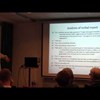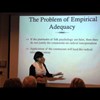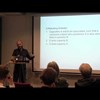cognitions
Collective behaviour and collective cognition
Jens Krause, Humboldt University, Berlin In his talk Krause will explain some of the basic principles of collective behaviour and collective cognition. Some of the case studies are based on experiments

Implicit Mind: Is there a joint in nature between perception and cognition? with Ned Block
Recording from the Implicit Mind Workshop at the Institute for Futures Studies in Stockholm, May 2015.

Implicit Mind: Implicit Cognition and Self-Perception with Petter Johansson
Recording from the Implicit Mind Workshop at the Institute for Futures Studies in Stockholm, May 2015.

Implicit Mind: Radical Interpretation and Implicit Cognition with Anandi Hattiangadi
Recording from the Implicit Mind Workshop at the Institute for Futures Studies in Stockholm, May 2015.

Implicit Mind: Implicit Cognition in the Vegetative State with Tim Bayne
Recording from the Implicit Mind Workshop at the Institute for Futures Studies in Stockholm, May 2015.

Implicit Mind: Core Cognition: Implicit Knowledge? with Susan Carey
Recording from the Implicit Mind Workshop at the Institute for Futures Studies in Stockholm, May 2015
The role of psychosocial school conditions in adolescent prosocial behaviour
School Psychology International, vol. 36, no. 3, pp. 283-300. Abstract This study examined how psychosocial conditions at school are associated with prosocial behaviour, a key indicator of positive me
Researchers wanted for a project on children's living conditions
The Institute for Futures Studies (IF), Stockholm, is appointing one or two researchers (sociologist/social scientist) to the projects: YOUNG: Children’s living conditions in a changing society: SocioeYOUNGWORK: Early labour market outcomes of young adults
Childbearing and Psycho-Social Work Life Conditions in Sweden 1991-2000
This paper investigates the interaction between psycho-social work conditions and the likelihood of childbearing. For women, the results indicate that high-strain employees have a lower likelihood of
Completed: Children’s living conditions in a changing society. Socioeconomic and ethnic inequality
How are children affected by changes in income, educational reforms, immigration or changes in the family? Children's living conditions are examined with a focus on socioeconomic and ethnic inequalities.








